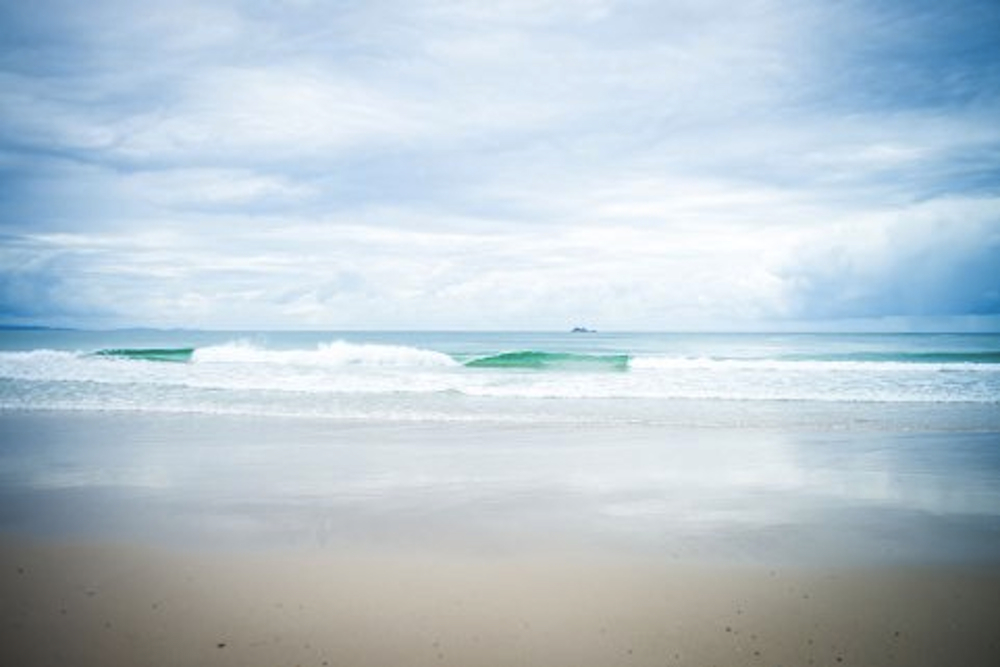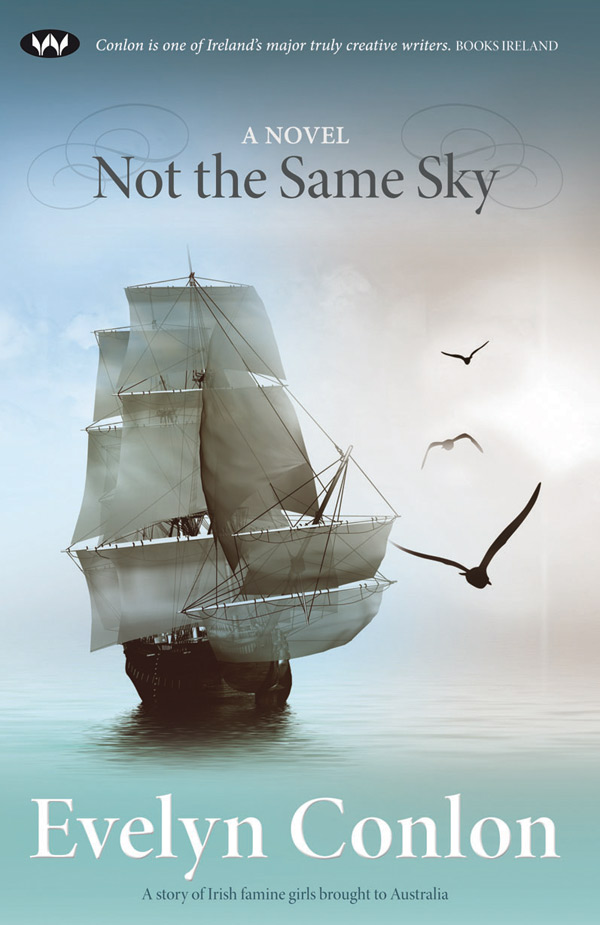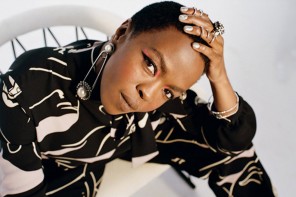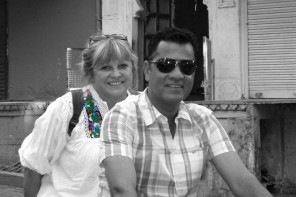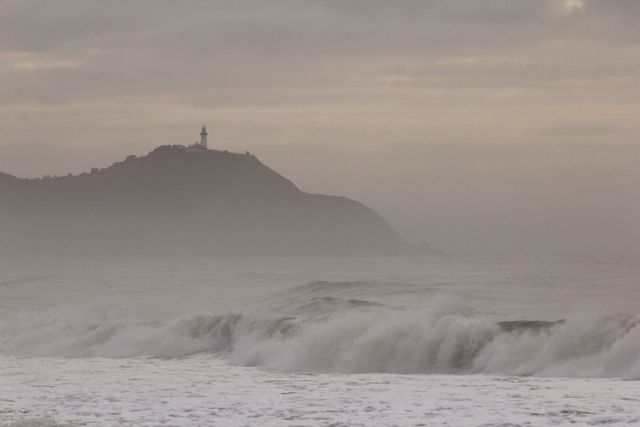Irish writer Evelyn Conlon is coming back to Byron Bay for this year’s Writers’ Festival. She writes about her memories of Australia, and how it finds its way into her writing.
It was while getting ready for the dive into the shadowy waters of publishing PR that Byron Bay came into my head. My memory can hatch it quite well when walking around Rathmines in Dublin, although clearly I don’t think about it every day, that might be a bit odd. I was on a comparison kick so indulged myself a bit, having just finished a series of radio essays comparing like things, for instance Independent Bookshops – one in Liverpool, News from Nowhere and one in Dublin Books Upstairs, terrific places that somehow or another have survived the attempted blanching of all things literary.
I also wrote one about two Blayneys, one beside where I was born in Monaghan and one in NSW. There’s nothing that joins them really except their names, the fact that their populations are 3355 and 3634 and that I wanted to write about them in order to have an excuse, in a Dublin winter, to imagine grass white with sun, and immense cloud free skies that drop into eternity. It’s a long time between the beginning of Autumn and June, when suddenly the flowers are all broken out of the ground, it’s bright until 10pm and then10.30 and then later still, until we can stretch it to 11pm or more out on the West coast of Ireland. As you can see I’m a successful bilocational sort of person, without having to do the flight. But then, like at this minute, that’s what writers do, imagine themselves to be someone else sending long distance messages in bottles.
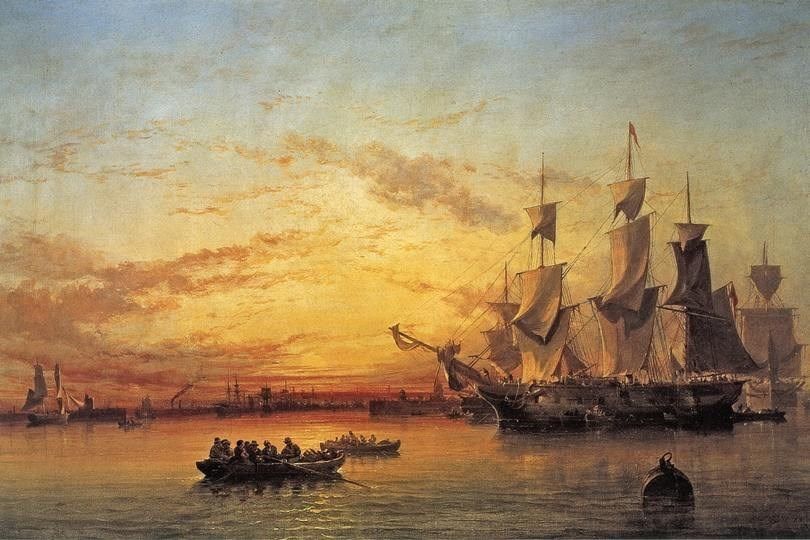
Edwin Hayes: An Emigrant Ship, Dublin Bay, Sunset, 1853. Evelyn Conlon chose to talk about the painting from the National Gallery of Ireland because of the material in her novel, Not the Same Sky.
That morning had begun optimistically enough, the occasional last surprising gold leaf fluttering from the tree – we had thought them all gone, but no, some slow ones, maybe caught in a late thinking, hiding up in the branches for some final rumination, take their time before diving to the ground to begin a different life. The National Gallery of Ireland had decided to celebrate its 150th birthday by having a number of writers respond to a painting in their collection, and as one of the writers I had been asked to speak about why I had written what I had written. So I almost missed perhaps the very final leaf flying its solo dash through Stephen’s Green. I talked my talk and questions came from the floor and I was suddenly in Australia again. I suppose I should not have been surprised about how quickly that happened but I was. I had chosen two paintings one looking at the other, and a character from one speaking to the other. The paintings are A Lady Holding a Doll’s Rattle, 1885, by Sarah Purser and An Emigrant Ship, Dublin Bay, Sunset, 1853, by Edwin Hayes. The reason I had chosen the Edwin Hayes is because of the material that I had been soaked in for years now, all associated with my novel Not the Same Sky which tries to brushstroke the life of Irish Famine girls being brought on 21 ships to a place called Australia. Imagine that. (If I’d been asked now I might have chosen differently, because I’m lost in the world of the Irish woman who attempted to assassinate Mussolini and nearly blooming succeeded. There’s another thing to imagine. What if she had.) But that morning we had a wonderful hour in the National Gallery trying to tease out what we thought those girls memories may have added to your history.
The fright of the PR to come is what took me back in time to bookshops that do their work and know their staunch readers and what they might like. Like many writers I balk at PR, it’s the opposite of what we do . When asked what prizes I think a book should be entered for, I hesitate because oh I do hate them. I hate what they’ve done to reading, what they’ve done to writers. And although I understand that they can be a method of bringing attention to the as yet unknown, when the bookshop experience seems like you’ve been tipped into a tombola then clearly we have lost sight of the art of finding our own books. Bookshops are supposed to be places where we get lost, they should have a touch of Hundertwasser about them. There should be a slight secrecy attached to finding a book, just the one we need at that time. We should not be bulldozed by giddy marketing.
I know that discussing the present hurricane of prizes may seem like a hefty jump from walking into a bookshop but I think not. I am of course seriously aware that this is a very tricky area for a writer to touch – we don’t do it because we are afraid of being accused of having sour grapes. But I’ll chance it, because far too many of us are being silenced by this tyranny and are afraid to be counted as skeptics. I see the over-emphasis of prizes as the devaluation of all those wonderful mysteries we were out looking for. For all that hope flying in on wings. For the expectation that we would have to search for a book that might satisfy our particular curiosities. Now there seems to be a conspiracy to have us all reading the same book at the same time. What could be more awful, more anathema to a non-school-goer’s right to life? (The exception to this is at Literary Festival Time, because that’s the terrific point of them, a sort of concert of reading where you’re nodding to a shared rhythm.) Leaving aside the fact that, yes, a Prize listing has become the new essential, consider for a moment what multinational publishing company has control over what is even allowed to be entered, never mind make it for consideration. And if you find this hard to believe just think of the system devised to find our first human to head to Mars. (In case you haven’t heard, the Irishman on the list, Joseph Roche, has just blown the lid on the crowdfunding aspect of the procedure. I am not joking. There’s a top 99 list now. ) Fay Weldon once remarked that prize ceremonies were not so much about rewarding the chosen winner but more about watching the cheque being snatched away from the others on the list. Or, as she recently remembered it to me…book prizes are rather like a dog show: a great entertainment at the expense of the writers. The leading writers of the land on show to have their disappointment viewed while all but one fails win.
And why did Byron Bay come back into my head? Because in looking for correspondence that I need for the job of shipping this novel out into Irish reading I came across emails from your bookshop. That time I visited, 2011, there had been one of those weird publisher/ distributor secret rows and my books did not arrive in time, despite all the hard work of the jolly happy book shop in Byron Bay. Let’s hope we arrive at the same time this year. I will soon begin to prepare, while I sadly salute my friend Paul Cox, whom I met at Byron Bay last time.
I don’t know all your bookshops – I did not have enough time – but I presume you treasure them. There’s an astonishing image from the book, An Evil Cradling, which Brian Keenan wrote about his hostage captivity in Lebanon. A bowl of fruit is left before him and although he really desires and needs it he wants to keep the orange uneaten because the colour will last longer if he doesn’t peel it. The colour was essential to his living. So are bookshops. If you’ve ever looked up at the swishing sound a flock of birds make you will know that it leaves a freedom in its wake. It rustles the air around you. Becoming missing in your local bookshop can do that too.
Evelyn Conlon, Her latest novel, Not the Same Sky, was published by Wakefield Press, 2013, and released in Ireland in 2015. Details on www.evelynconlon.com She will be attending the 2016 Byron Bay Writers’ Festival, participating and giving a workshop. Go to byronwritersfestival

